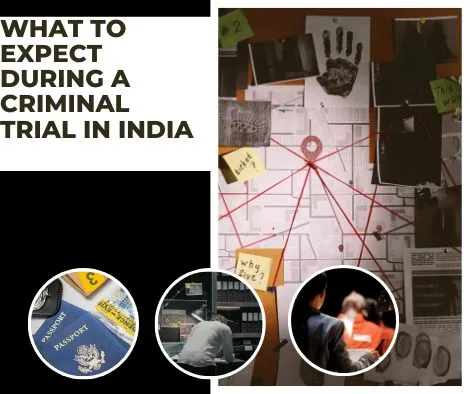This article is The Ultimate Guide to Criminal Cases in India.
Introduction: Understanding the Landscape of Criminal Law in India
Criminal law in India is a comprehensive and intricate system designed to maintain law and order, protect the rights of individuals, and uphold justice. Governed by various statutes, the most prominent being the Indian Penal Code (IPC), Code of Criminal Procedure (CrPC), and the Indian Evidence Act, the realm of criminal law in India is vast and complex.
The Ultimate Guide to Criminal Cases in India
The Backbone of Indian Criminal Law: Key Statutes and Their Roles
The Indian Penal Code (IPC)
The IPC, established in 1860, is the primary penal code of India, outlining definitions and punishments for various offenses. It serves as the fundamental legal framework for criminal law in the country.
The Code of Criminal Procedure (CrPC)
The CrPC, enacted in 1973, provides the detailed procedure for the administration of criminal law in India. It includes provisions for the investigation of crime, collection of evidence, conduct of trials, and the pronouncement of judgments.
The Indian Evidence Act
This Act, implemented in 1872, governs the evidence that can be presented and the relevance of such evidence in Indian courts. It plays a crucial role in criminal trials by outlining the rules for admissibility and weight of evidence.
Navigating the Criminal Justice Process in India
Filing an FIR: The First Step in a Criminal Case
Filing a First Information Report (FIR) is the initial and crucial step in pursuing a criminal case in India. It sets the criminal justice process in motion, informing the police of a cognizable offense.
Investigation and Evidence Collection
Post-FIR, the police conduct investigations, collect evidence, and may arrest the accused. The investigation’s findings are compiled into a ‘charge sheet,’ which is then submitted to the court.
Trial Process
Criminal trials in India follow a set procedure: framing of charges, prosecution evidence, defense evidence, final arguments, and judgment.
The Role of Courts
Different levels of courts in India, including District Courts, High Courts, and the Supreme Court, play distinct roles in the adjudication of criminal cases.
Key Elements in Criminal Trials
The Principle of ‘Presumption of Innocence’
A cornerstone of criminal jurisprudence, this principle ensures that an accused is presumed innocent until proven guilty, placing the burden of proof on the prosecution.
Role of Legal Representation
The right to legal representation is fundamental in criminal cases. Both the prosecution and defense are represented by lawyers who present evidence and arguments.
Witness Examination and Cross-Examination
Witness testimonies are critical in criminal trials. The process of examination and cross-examination seeks to establish the truth based on witness accounts.
Contemporary Challenges and Reforms
Overburdened Judicial System
One of the significant challenges in the Indian criminal justice system is the backlog of cases and delayed justice.
Need for Judicial Reforms
There is a growing demand for reforms in criminal law, including faster trials, better investigation techniques, and improved legal aid for the underprivileged.
Technological Integration
Incorporating technology in legal processes is seen as a way to expedite trials and make the justice system more efficient and transparent.
Conclusion: The Road Ahead for Criminal Law in India
The landscape of criminal cases in India is evolving, with continuous efforts to balance the scales of justice and efficiency. Understanding the nuances of criminal law in India is crucial for anyone navigating this legal territory. With ongoing reforms and technological advancements, the Indian criminal justice system is poised for significant transformation, aiming to uphold the principles of justice, fairness, and equality before the law.
FAQ: The Ultimate Guide to Criminal Cases in India
1. What is the Indian Penal Code (IPC)?
- The IPC is the primary penal code in India, defining various criminal offenses and their respective punishments.
2. What role does the Code of Criminal Procedure (CrPC) play?
- The CrPC outlines the procedure for the administration of criminal justice, including investigation, trial, and judgment processes.
3. What is the importance of the Indian Evidence Act?
- It governs the admissibility and relevance of evidence in Indian courts, crucial for criminal trials.
4. How do I file a First Information Report (FIR)?
- An FIR can be filed at the nearest police station or online in some states, detailing the cognizable offense committed.
5. What happens after an FIR is filed?
- The police conduct an investigation, collect evidence, and may arrest the accused based on the FIR.
6. What is a ‘charge sheet’?
- A charge sheet is a formal document submitted by the police to the court, summarizing the investigation and evidence against the accused.
7. How is a criminal trial conducted in India?
- A trial involves framing charges, presenting prosecution and defense evidence, arguments, and a final judgment.
8. What is the principle of ‘Presumption of Innocence’?
- It means the accused is presumed innocent until proven guilty, and the prosecution bears the burden of proof.
9. What is legal representation in criminal cases?
- Both parties (prosecution and defense) have the right to be represented by lawyers who argue the case on their behalf.
10. What is the role of witnesses in a trial? –
- Witnesses provide testimonies which are examined and cross-examined to establish facts in the case.
11. What are the different levels of courts in India? –
- India has District Courts, High Courts, and the Supreme Court, each with different roles in criminal cases.
12. What is a cognizable offense? –
- A cognizable offense is one where the police can arrest without a warrant and start an investigation.
13. What is a non-cognizable offense?
- For these offenses, the police require a court’s permission to investigate or arrest.
14. How long do criminal trials last in India?
- Duration varies based on case complexity, but delays are common due to the judicial backlog.
15. What are some common criminal offenses under the IPC?
- These include theft, murder, rape, fraud, and assault, among others.
16. Can criminal cases be settled out of court?
- Some cases, like minor offenses, can be settled out of court, but serious crimes must go through the legal process.
17. What is bail in criminal cases?
- Bail is a temporary release from custody, granted under specific conditions and financial guarantees.
18. Can a police officer refuse to file an FIR?
- Legally, no. If refused, one can approach a higher police authority or file a judicial complaint.
19. What is a public prosecutor?
- A public prosecutor is a lawyer representing the state or the people in criminal trials.
20. What is the difference between a trial court and an appellate court?
- A trial court hears the case first, while an appellate court reviews the trial court’s decision upon appeal.
21. What are fast-track courts?
- These are special courts designed to expedite trials in certain types of criminal cases.
22. Can the decision of a criminal court be appealed?
- Yes, parties can appeal to a higher court if dissatisfied with a trial court’s decision.
23. What is a ‘compoundable offense’?
- These are offenses where the complainant can agree to have the charges dropped against the accused.
24. What is forensic evidence?
- Forensic evidence is scientific evidence, like DNA or fingerprints, used to support or refute arguments in court.
25. What rights do accused individuals have in India?
- They have rights like the presumption of innocence, right to legal counsel, and protection from self-incrimination.
26. What is ‘custodial interrogation’?
- It refers to questioning by the police while the accused is in their custody.
27. Are juvenile offenders treated differently?
- Yes, they are dealt with under the Juvenile Justice Act and usually face less severe consequences.
28. What is ‘anticipatory bail’?
- It is a bail granted in anticipation of arrest, allowing the person to avoid police custody upon arrest.
29. Can a criminal case be reopened after judgment?
- Under certain conditions, like new evidence, a case can be reopened or reviewed.
30. What is a ‘summary trial’ in Indian law?
- It’s a quicker trial procedure for less serious offenses, with simplified rules of evidence and procedure.
















